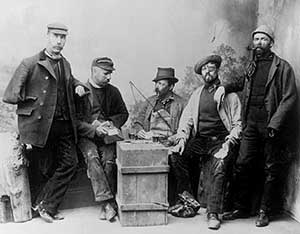Covert operation
Covert operation refers to activities undertaken by governments or organizations to achieve their objectives through secret, non-attributable means. These operations are designed to conceal the identity of the sponsors or to make the operation appear as though it is being carried out by entities unconnected to the primary actors. Covert operations are often associated with intelligence agencies, military operations, and state-sponsored activities that aim to influence political, military, or economic conditions in other countries without revealing their involvement.
Overview[edit | edit source]
Covert operations can range from cyber espionage, sabotage, assassinations, propaganda campaigns, support to guerrilla warfare or insurgencies, and election interference. These operations are considered a tool of foreign policy and national security, employed when overt actions are either not feasible or too risky. The primary goal is to achieve strategic advantages without escalating conflicts to open warfare or damaging diplomatic relations.
Legal and Ethical Considerations[edit | edit source]
The legality and ethics of covert operations are subjects of considerable debate. On one hand, they can be seen as necessary tools for protecting national security and advancing national interests. On the other hand, they can undermine international law, violate the sovereignty of other nations, and lead to unintended consequences, including escalation of conflicts or harm to civilian populations. International law, including the United Nations Charter, sets forth principles governing state behavior, but the secretive nature of covert operations makes it challenging to hold states accountable for their actions.
Historical Examples[edit | edit source]
Throughout history, covert operations have played pivotal roles in shaping geopolitical landscapes. For example, during the Cold War, both the United States and the Soviet Union engaged in numerous covert operations to expand their influence and counter each other's presence around the globe. The CIA's involvement in the 1953 Iranian coup and the Soviet KGB's support for revolutionary movements are notable examples.
Modern Challenges[edit | edit source]
In the digital age, the scope and complexity of covert operations have expanded significantly. Cyber warfare and information warfare have become critical fronts, with state and non-state actors leveraging the internet to conduct espionage, spread disinformation, and interfere in the internal affairs of other nations. The proliferation of digital technologies has made it easier to conduct these operations on a global scale, raising new challenges for security and international relations.
Conclusion[edit | edit source]
Covert operations remain a controversial yet integral component of statecraft. While they offer a means to achieve strategic objectives discreetly, they also pose significant ethical, legal, and security dilemmas. Balancing the benefits of these operations against their potential risks and consequences is a complex task facing governments worldwide.
Search WikiMD
Ad.Tired of being Overweight? Try W8MD's physician weight loss program.
Semaglutide (Ozempic / Wegovy and Tirzepatide (Mounjaro / Zepbound) available.
Advertise on WikiMD
|
WikiMD's Wellness Encyclopedia |
| Let Food Be Thy Medicine Medicine Thy Food - Hippocrates |
Translate this page: - East Asian
中文,
日本,
한국어,
South Asian
हिन्दी,
தமிழ்,
తెలుగు,
Urdu,
ಕನ್ನಡ,
Southeast Asian
Indonesian,
Vietnamese,
Thai,
မြန်မာဘာသာ,
বাংলা
European
español,
Deutsch,
français,
Greek,
português do Brasil,
polski,
română,
русский,
Nederlands,
norsk,
svenska,
suomi,
Italian
Middle Eastern & African
عربى,
Turkish,
Persian,
Hebrew,
Afrikaans,
isiZulu,
Kiswahili,
Other
Bulgarian,
Hungarian,
Czech,
Swedish,
മലയാളം,
मराठी,
ਪੰਜਾਬੀ,
ગુજરાતી,
Portuguese,
Ukrainian
Medical Disclaimer: WikiMD is not a substitute for professional medical advice. The information on WikiMD is provided as an information resource only, may be incorrect, outdated or misleading, and is not to be used or relied on for any diagnostic or treatment purposes. Please consult your health care provider before making any healthcare decisions or for guidance about a specific medical condition. WikiMD expressly disclaims responsibility, and shall have no liability, for any damages, loss, injury, or liability whatsoever suffered as a result of your reliance on the information contained in this site. By visiting this site you agree to the foregoing terms and conditions, which may from time to time be changed or supplemented by WikiMD. If you do not agree to the foregoing terms and conditions, you should not enter or use this site. See full disclaimer.
Credits:Most images are courtesy of Wikimedia commons, and templates, categories Wikipedia, licensed under CC BY SA or similar.
Contributors: Prab R. Tumpati, MD

